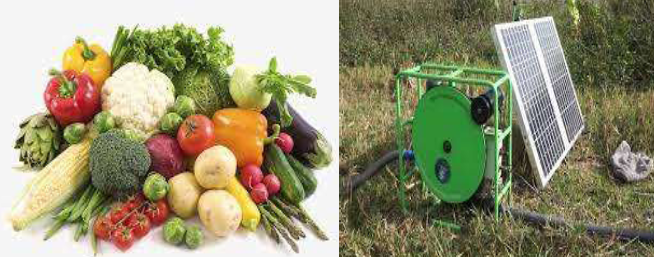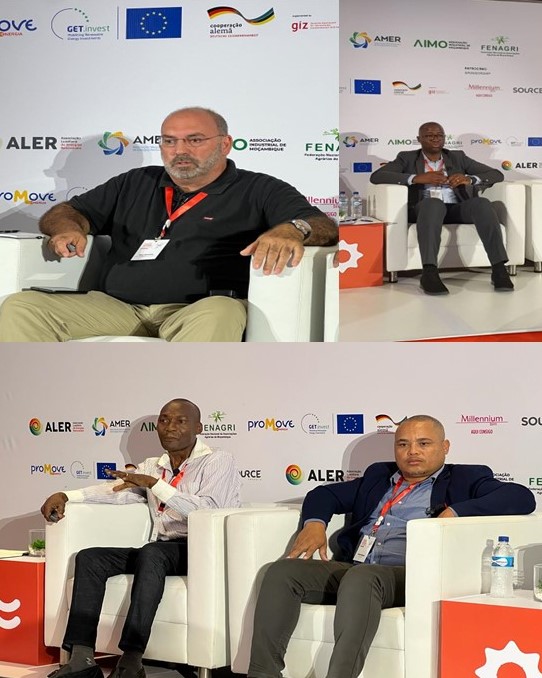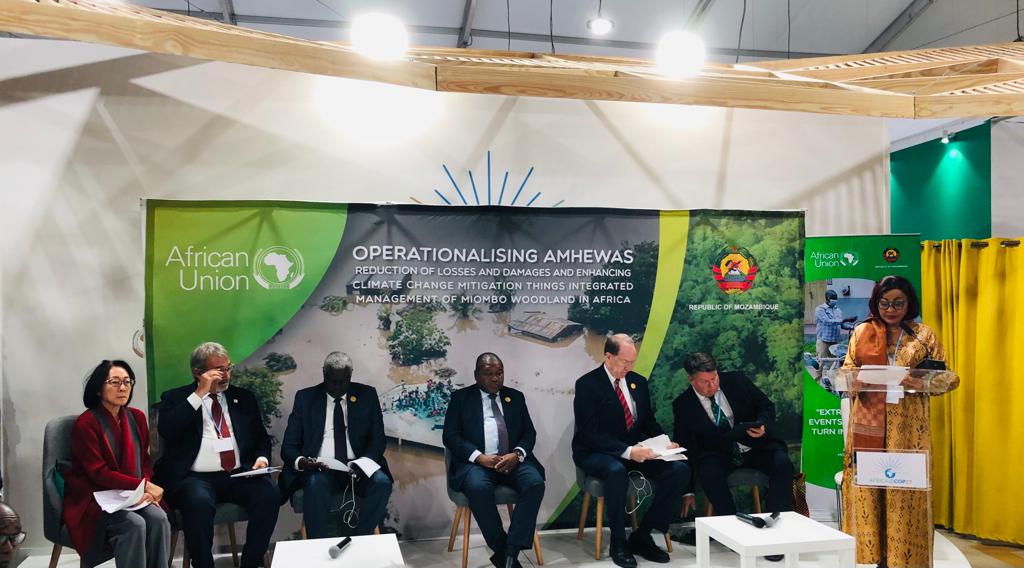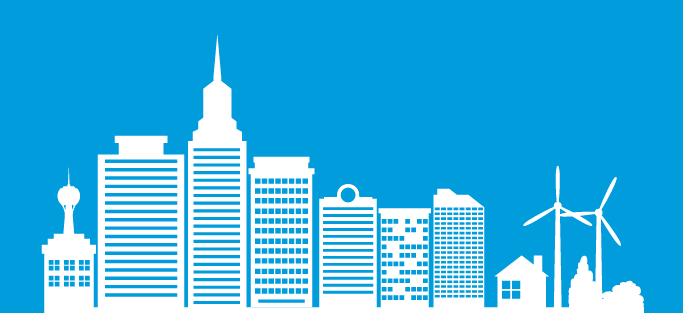
Launched in April 2021, the credit line is the result of a partnership between the United Nations Industrial Development Organization (UNIDO), BCI Bank, and the Energy Fund (FUNAE) with funding from the Global Environment Facility (GEF) in the ambit of the Towards Sustainable Energy for All in Mozambique project.
The BCI Super credit line is budgeted at around 60 million meticais and, as stated by BCI Director Miguel Alves, " The credit line is in the form of a guarantee fund for risk mitigation, with the expectation of simplifying the terms and conditions required for adherence”.
This fund is the first of its kind in Mozambique allowing small and medium-sized enterprises, individual entrepreneurs, associations, cooperatives and NGOs to access funds with attractive conditions, including a fixed annual interest rate of 7.5 percent.
To date 5 PMEs namely; Tsangano Agrifarms, Frangos de Mahubo LDA, Sheine Water LDA, SuperKwick LDA, and Agropecuaria have accessed the the credit line for the implementation of renewable energy projects for productive uses.
Tsangano Agrifarms; is the process of installing a 6.0kW solar photovoltaic system to harness the sun's energy to pump water to irrigate crops, power agricultural machinery and equipment, provide light, heat, and ventilation to farm buildings, haylofts, pigsties, livestock and energy for cooling in the horticultural processing factory and freezing in the abattoir chamber.
Frangos de Mahubo LDA; became the 3rd entity to receive funding under the credit line. The funds have been successfully used for the installation of a 50kW solar photovoltaic system, with the possibility of expansion in the future.
Sheine Water LDA; secured a loan to install a solar system for the supply of drinking water to 100 customers in FAO/Nhumbane community, Marracuene district of Maputo province. the Shine Water solar powered water supply system expanded its reach to cover health centres, schools, construction brick laying sites, and subsistence horticultural gardens. According to community members, most residents of FAO/Nhumbane locality (90% women) depend on the income generated from the selling of vegetables and fruits produced from their subsistence gardens and reliable 24 hours per day water supply is necessary for increased productivity, and thus more income generation
SUPERKWICK LDA received funds through the BCI SUPER credit line to install a solar system capable of generating 2515W of power to enable the pumping of water for irrigation of macadamia, cashew, rice, bean crops farms covering an area of 10 ha in Macia- Bilene, Gaza province.
Cooperativa Agropecuária & Empreendimentos Rurais, Limitada became the 5th recipient of the credit line and will install an irrigation system powered by two (2) Future SF2 solar pumps to irrigate an area of 4 hectares of vegetables in the lower Nhandzihe River, located in the North of Zavala District, Inhambane. Located in rural Mozambique, almost 97% of the farmers in Zavala district do not have experience in solar powered irrigation systems and rely on rudimental methods for crop irrigation.“Acquisition of the SF2 solar pumps for irrigation will lead to increased productivity and therefore, attract the interest of other farmers in the region who are currently relying on traditional irrigation methods with low productivity capacity”- Alcidio Chinolane, Manager- Cooperativa Agropecuária & Empreendimentos Rurais, Limitada
The BCI SUPER Credit Line for financing renewable energy systems for productive uses was launched in April 2021. The fund is the first of its kind in Mozambique allowing Small and Medium Enterprises, Individual Entrepreneurs, Associations, Cooperatives, NGOs to access funds with attractive conditions, including a fixed annual interest rate of 7.5%.
Entities interested in benefiting from this funding can express their interest through the project website www.tse4allm.org.mz
Fill the form HERE to express your interest

Cooperativa Agropecuária & Empreendimentos Rurais, Limitada became the 5th recipient of the credit line and will install an irrigation system powered by two (2) Future SF2 solar pumps to irrigate an area of 4 hectares (4ha) of vegetables in the lower Nhandzihe River, located in the North of Zavala District, Inhambane
Located in rural Mozambique, almost 97% of the farmers in Zavala district do not have experience in solar powered irrigation systems and rely on rudimental methods for crop irrigation.
“Acquisition of the SF2 solar pumps for irrigation will lead to increased productivity and therefore, attract the interest of other farmers in the region who are currently relying on traditional irrigation methods with low productivity capacity”- Alcidio Chinolane, Manager- Cooperativa Agropecuária & Empreendimentos Rurais, Limitada
With the use of the solar irrigation system, is expected that the agribusiness company will increase its production capacity from 30 Tons of vegetables per year to 150 tons of vegetables per year, thus contributing to the improvement of food security in the district.
For the district, it is expected to be a very visible initiative for the promotion of sustainable agriculture practices and replicable to other regions of the district and the province, promoting the sustainable use of renewable energies in Agriculture.

A conferência "Renováveis para a Indústria e Agricultura em Moçambique" foi organizada pela Associação Lusófona de Energias Renováveis (ALER), a Associação Moçambicana de Energias Renováveis (AMER), a Associação das Indústrias Moçambicanas (AIMO) e a Federação Nacional das Associações Agrícolas de Moçambique (FENAGRI)
Realizado a 17 de Novembro de 2022 em Maputo, o evento procurou sensibilizar e fornecer informações sobre o quadro regulamentar e os benefícios da utilização e aplicação de energias renováveis nos sectores Agrícola e Industrial aos empresários moçambicanos e também demonstrar as oportunidades de financiamento disponíveis para este tipo de projectos.
Os intervenientes moçambicanos no sector da energia apresentaram os seus estudos de caso e ofertas para projectos de energias renováveis para o sector industrial e agrícola. A experiência da UNIDO na implementação de mecanismos financeiros inovadores através do projecto TSE4ALLM foi partilhada sublinhando lições e desafios chave ao implementar a linha de crédito em parceria com o FUNAE e BCI. No mesmo evento, 3 parceiros de implementação do TSE4ALLM, nomeadamente Frangos de Mahubo, Superkwick Lda, e o Ministério da Agricultura e Desenvolvimento Rural (MADER) destacaram os benefícios, desafios, lições aprendidas durante a implementação dos seus projectos de energias renováveis financiados pela UNIDO e pelo GEF nas suas respectivas actividades agrícolas.
FRANGOS DE MAHUBO AGROPECUARIA LDA recebeu apoio da UNIDO para instalar um sistema solar fotovoltaico de 50kw para complementar o biodigestor existente. "Utilizamos biogás para o aquecimento das galináceas, e para cozinhar. Temos resíduos agrícolas e de frangos que podem ser utilizados para a produção de biogás, mas infelizmente existe um conhecimento e capacidade limitados para utilizar este tipo de energia" - Sr. Rui Gomes, Proprietário, Frangos de Mahubo
MADER - Ministério da Agricultura e Desenvolvimento Rural - Direcção Nacional para o Desenvolvimento Económico Local está em parceria com a UNIDO para implementar um projecto de demonstração de sistemas integrados de energias renováveis na Quinta Irini. O objectivo do projecto-piloto é demonstrar como a adopção de sistemas integrados de energias renováveis para usos produtivos pode contribuir para o aumento da sustentabilidade, produtividade e eficiência nos processos de produção e comercialização de produtos agrícolas na zona rural de Mafuiane. "O projecto irá instalar os seguintes sistemas integrados; Sistema de fornecimento de água solar para irrigação e agro-processamento; Secadores solares para frutas e vegetais; Moagem/Moagem solar; e um Digestor anaeróbico para produção de biogás e fertilizantes" ---- Eng. Tiago, Ministério da Agricultura
Superkwick Lda recebeu fundos através da linha de crédito BCI SUPER para instalar um sistema solar capaz de gerar 2515W de energia para permitir o bombeamento de água para irrigação de macadâmia, caju, arroz, culturas de feijão cobrindo uma área de 30 ha em Macia Bilene

De 6 a 11 de Novembro Moçambique esteve representado na 27ª Conferência das Partes (COP27) em Sharm el-Sheikh, Egipto, que reuniu mais de 100 chefes de Estado para discutir a Acção Climática. Dezenas de países estiveram representados em pavilhões para ajudar a partilhar o seu ponto de vista sobre acções concretas que são necessárias para corrigir as alterações climáticas.
A conferência teve como pano de fundo a ambição inadequada de reduzir as emissões de gases com efeito de estufa (GEE), a par de outros tópicos críticos que fazem parte da conversa sobre as alterações climáticas. De acordo com o Painel Intergovernamental sobre Alterações Climáticas da ONU, as emissões de CO2 têm de ser reduzidas em 45% até 2030, em comparação com os níveis de 2010, a fim de cumprir o objectivo central do Acordo de Paris de limitar o aumento da temperatura a 1,5 graus Celsius até ao final deste século.
"O Governo de Moçambique olha para a COP27 como um palco para alavancar o financiamento climático, a fim de alcançar a transição de baixo carbono em linha com o NDC", Ivete Maibaze, Ministra da Terra e do Ambiente de Moçambique,
Segundo a Ministra Maibaze, as principais áreas de interesse do país na conferência COP27 foram: financiamento no contexto das alterações climáticas, a Contribuição Determinada a Nível Nacional (NDC), Energias Renováveis, Redução de Emissões por Desflorestação e Degradação Florestal, adaptação às alterações climáticas e redução do risco de desastres, bem como questões de Género e Alterações Climáticas.
A adopção de tecnologias de energias renováveis é parte integrante das NDCs pretendidas de Moçambique ao abrigo do Acordo de Paris. As acções políticas orientadas para a realização dos objectivos a longo prazo do Acordo de Paris incluem; a Estratégia de Desenvolvimento de Energias Novas e Renováveis (2011 a 2025); Conservação e Utilização Sustentável da Energia a partir da Biomassa (2014 a 2025); Regulamento Tarifário de Alimentação de Energia Renovável (REFIT); e o Atlas de Energias Renováveis para Moçambique. Com base nas acções políticas mencionadas, o país estima, numa base preliminar, a redução total de cerca de 76,5 MtCO2eq (toneladas métricas de dióxido de carbono equivalentes) no período de 2020 a 2030, com 23,0 MtCO2eq até 2024 e 53,4 MtCO2eq de 2025 a 2030.
Optimamente, a implementação efectiva dos pontos de acção previstos limitará as emissões de GEE e, ao mesmo tempo, contribuirá para a melhoria do bem-estar dos moçambicanos através do aumento do acesso a fontes de energias renováveis e a serviços básicos como saneamento, saúde e educação. Além disso, Moçambique está disposto a participar nos mecanismos de mercado a serem estabelecidos que permitam o acesso a tecnologias limpas a fim de mitigar as emissões resultantes da exploração, gestão e utilização do capital natural que está disponível.
Apesar do compromisso do Governo de aumentar até 20% até 2040 a contribuição de novas fontes de energias renováveis para a matriz energética, serão necessárias decisões estratégicas sobre as principais fontes de energia, tendo em conta as mudanças que a economia global está a sofrer. Mais ainda, à medida que o país avança no desenvolvimento e industrialização, Moçambique precisa de avançar estrategicamente e rapidamente para a realização das suas Contribuições Determinadas a Nível Nacional (CND), de acordo com o Acordo de Paris sobre Alterações Climáticas.

A reunião "bridge for cities" da UNIDO de 2022, realizada a 31 de Outubro de 2022, ofereceu uma plataforma através da qual as cidades partilharam os seus planos de desenvolvimento e soluções inovadoras para a acção climática e para enfrentar a crise energética. Dado que as parcerias público-privadas demonstraram um grande potencial de escalabilidade, desencadeando investimentos em soluções inovadoras para o clima e energia efficient, o evento também encorajou os intervenientes urbanos, incluindo o sector privado, a aumentar o seu envolvimento em iniciativas de desenvolvimento urbano-industrial inclusivas e sustentáveis. Aqui estão 5 retiradas da conferência para o sector da energetica.
1. A energia é uma parte integrante do planeamento urbano sustentável
A energia, como parte integrante do planeamento urbano sustentável, pode ajudar a tornar as cidades mais seguras, melhorar o saneamento e a saúde e criar conceitos de transporte e mobilidade sustentáveis. Promover a instalação de luzes e aumentar a segurança em locais públicos pode ser útil para a criação de um ambiente mais seguro para as mulheres.
2. As políticas de transição energética e a mudança para as energias renováveis desempenharão um papel crucial no combate contra as alterações climáticas.
A maioria das economias em todo o mundo enfrenta uma crise energética cada vez mais profunda, devido a perturbações no fornecimento global e a preços de energia elevados. As cidades, responsáveis por até 80% do consumo mundial de energia, são certamente as mais afectadas. As políticas de transição energética e a transição para as energias renováveis desempenharão um papel crucial na luta contra as mudanças climáticas e podem, ao mesmo tempo, trazer benefícios às cidades e aos cidadãos a nível mundial.
3. Marketing social crucial para a mudança de comportamento no sentido de uma melhor eficiência energética das famílias
Num ambiente urbano, os agregados familiares representam uma proporção substancial do consumo global de energia. O marketing social deve ser utilizado para alcançar mudanças de comportamento que promovam uma maior sustentabilidade através da melhoria da eficiência energética dos agregados familiares.
4. A utilização de tecnologias verdes garante o maior impacto para a acção climática a nível da cidade e fomenta o desenvolvimento e a inovação verdes.
A utilização de tecnologias verdes como as energias renováveis que geram electricidade verde, sistemas de rede inteligentes que ligam as estações de carregamento de veículos eléctricos à rede para fornecer electricidade eficientemente, e veículos eléctricos que reduzem drasticamente as emissões de carbono através da utilização de electricidade verde, asseguram o maior impacto para a acção climática a nível da cidade e fomentam o desenvolvimento verde, bem como a inovação.
5. A transição para fontes de energia renováveis e a actualização dos sistemas de transmissão de energia existentes é da maior importância.
As cidades consomem actualmente mais os dois terços do fornecimento global de energia, a maioria dos quais ainda depende fortemente do carvão, do petróleo e do gás para cumprir estes requisitos. A transição para fontes de energias renováveis e a modernização dos sistemas de transmissão de energia existentes é da maior importância. Os contadores inteligentes e as redes inteligentes, por exemplo, precisam de ser introduzidos e adoptados nas cidades para registar os padrões de consumo de energia e equilibrar as necessidades energéticas durante as horas de ponta.

